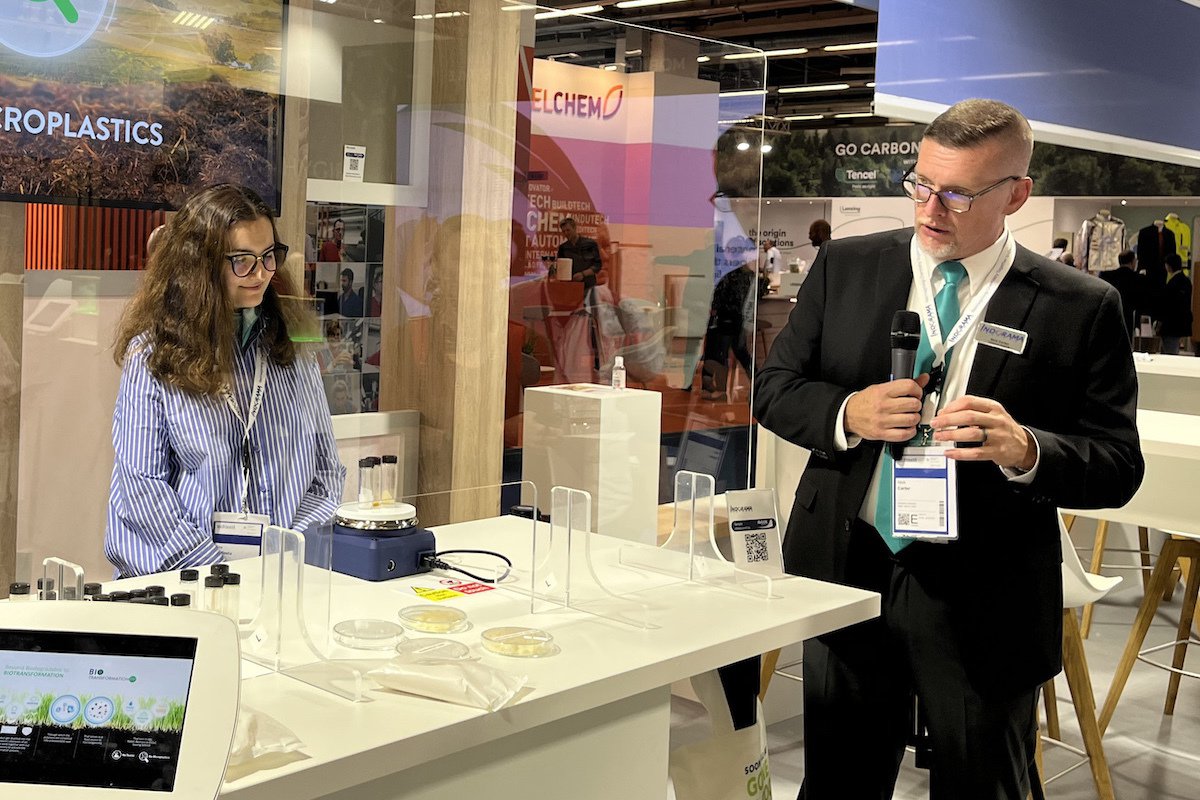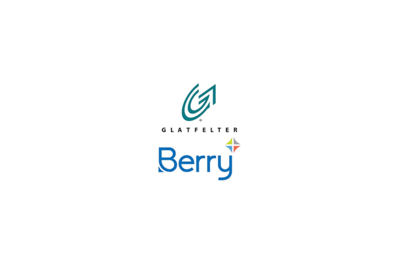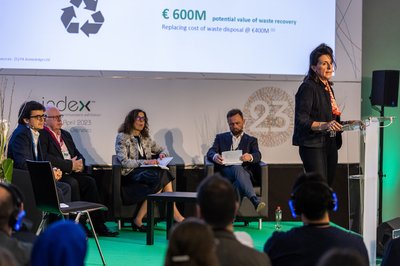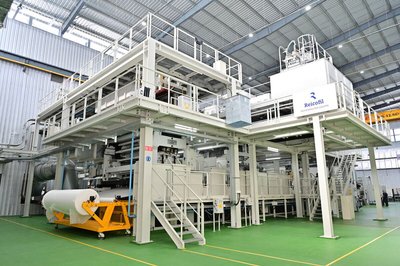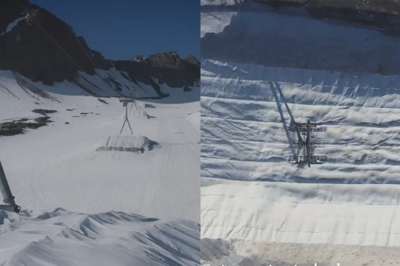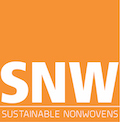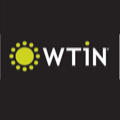
INDEX™ exhibitor Indorama Ventures (IVL) is a major supplier of fibres to the nonwovens industry and following its acquisition of Avgol in 2018, also a major manufacturer of spunmelt nonwovens.
Within the IVL Group, which had sales of $14.6 billion in 2021, the IVL Fibers business consists of three divisions – Mobility, Lifestyle and Hygiene – with combined sales in 2021 of $4 billion, based on the production of close to two million tons of fibre.
As a global leader in PET polymer recycling and with a commitment to the circular economy, IVL has 14 dedicated R&D centres worldwide and is involved in over 100 collaborative projects – many with emerging new companies, to which it can contribute both extensive know-how and the ability to scale.
Biotransformation
Avgol, for example, has been working with Polymateria, a spin-out from Imperial College London, which has pioneered the ‘biotransformation’ process which has the potential to enable the most commonly polluted plastic items to be safely returned to nature.
Using this new process, a nonwoven fabric can be modified to react to certain triggers to then begin a cascade process to enable the fundamental chemical transformation of its polymer resins into a wax that is readily degraded by natural bacteria, microbes and fungi normally found in the environment.
“The transformation is triggered through the combined effects of the natural elements of decay – air, moisture, heat and sunlight,” explained Avgol’s vice-president of nonwovens marketing Nick Carter. “Once triggered, the material will transform into a low molecular weight wax structure leaving no microplastics or toxic residue behind. In addition, if the product comprising the biotransformation technology is disposed of in the normal way, and facilities are available, it can then be recycled by readily available means.”
CiCLO
Another interesting Indorama Ventures (IVL) partnership is with North Carolina-based Intrinsic Advanced Materials (IAM), the developer of CiCLO, a technology which allows polyester and other synthetic materials to biodegrade as natural materials do in wastewater treatment plant sludge, sea water and landfill conditions.
IAM achieves this by embedding countless biodegradable spots throughout the matrix of the plastic, which act like nutrient sources for microbes that naturally exist in the environment.
When textiles and nonwovens made with CiCLO-enhanced fibres end up in environments where biodegradation can occur naturally, microbes are attracted to the fibres and can mineralize them at rates comparable to natural fibres such as wool.
Mattress to mattress
Indorama Ventures (IVL) has also collaborated with leading mattress manufacturer Auping, headquartered in Deventer, The Netherlands, and nonwovens manufacturer TWE Group, to deliver a fully circular and Cradle-to-Cradle certified process for mattress design, manufacturing and recycling.
The mattress is constructed using only two different base materials – 100% PET polyester textiles and steel wire pocket springs connected with Niaga, a non-toxic reversible adhesive. This makes it very easy to disassemble and recover.
The inclusion of safe raw materials within mattress manufacturing allows the materials to be easily disassembled at the product’s end of life and reused at the same quality level.
Auping collects, sorts and separates the components and the fabrics then go to IVL Mullagh in Ireland for processing, melting and extrusion to form polyester staple fibre. The recycled staple fibres are then converted by TWE Group into nonwovens for use in Auping’s Evolve – the world’s first fully circular mattress. Following the end of mattress use, the material recovery process simply starts again.
Auping estimates that annually more than 40 million mattresses are disposed of in Europe alone, the majority of which are incinerated. The company’s take back system in the Netherlands ensures that when a new mattress is delivered, the old mattress is retrieved and recycled, ensuring existing materials are continually optimised, diverted from landfill and kept in use.
“The transformation from linear to circular production requires patience and dedication, but also a strong drive to make a difference,” said Geert Doorlag, researcher on sustainability, sleep and ergonomics at Auping. “Partnerships are very important to us and we strongly believe in the importance of sharing knowledge and trying to translate insights into relevant solutions in cooperation with other parties.”
C-Zyme
One of the most promising partnerships for Indorama Ventures (IVL) is that with Carbios, based in Clermont-Ferrand, France.
Carbios has now succeeded in producing both 100% enzymatically recycled white PET fibre and bottle-grade PET from mixed coloured textile waste, using its C-Zyme process.
The significance of this achievement was underlined by Bruno Langlois, Carbios business development and partnership director, at EDANA’s International Nonwovens Conference held in Lyon, France, on June 8-9.
“Fibre to fibre recycling is the only way to achieve true circularity and for the pledges fashion brands have already made to be realised,” he said. “Our technology has the ability to tap into vast new sources for recycling PET and is based on a very selective enzyme that will only depolymerize PET and not other materials in waste clothing, such as adhesives, dyes and other polymers.
“The process is low temperature and operates at atmospheric pressure with no solvents. The PET is extracted and separated and the recovered monomers are virgin quality.”
Beyond packaging
Prior to the C-Zyme process, the waste textiles are shredded and densified to reduce crystallinity and increase the surface area. C-Zyme can then degrade 98% of such a mass in 16 hours.
Langlois pointed out that around 90 million tons of PET is produced each year, with around 27 million tons going into packaging and the remainder used to make fibres.
Currently, only 13% of textile waste is recycled, and mainly into lower value applications such as padding, insulation or wipers.
Not surprisingly, things are moving fast for the company, whose demonstration plant has only been operational since September 2021.
Since validating the C-Zyme process, Carbios has subsequently partnered with Indorama Ventures (IVL) to build an enzymatic PET bio-recycling production plant in Longlaville, Meurthe-et-Moselle, France, with a processing capacity of around 50,000 tons of post-consumer PET waste per year by 2025 – the equivalent to 2 billion PET bottles.
“C-Zyme means that virtually all PET that goes onto the market now has the potential to be recycled,” Langlois said. “We are targeting 90-95% recovery of polymers from the textile waste material.”
Miraculous
For all of this work, Indorama Ventures (IVL) remains committed to synthetic fibres and plastics more generally.
“Plastic is a material that can be endlessly recycled and what’s needed now is to properly manage it, not ban it,” said IVL CEO Uday Gill. “A ban makes no sense because it really is a miraculous material – it does not deteriorate and can be used a thousand times. The problem is not with plastic, but human irresponsibility, so let’s fix that. With plastics, we have turned a perfect solution for many good things into a problem, but awareness and action is really starting now, and this problem will eventually be fixed.”
